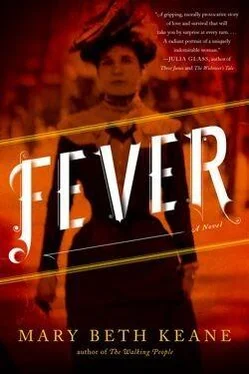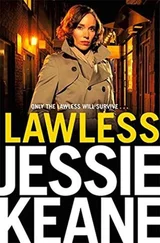“I won’t let them open me. I’ve told them already. You can tell them, too.”
Dr. Baker regarded her in silence for a moment, and then nodded. “They’ll send you to North Brother Island. They’ll put you in quarantine.”
“They can’t. I’m not sick. I didn’t do anything wrong.” Mary thought of the paper and envelope waiting for her by her bed. No matter how Alfred was feeling, no matter what kind of week he was having, he’d hear the beating heart at the center of her message and he’d leave whatever he was doing to find her and help her figure a way out of this trouble. Once, about five years earlier, when she was miserable at a job in Riverdale, he’d shown up in her employer’s kitchen one morning to see for himself how low she was, and when she told him everything that she’d promised herself she would not tell him — that the missus had slapped a tutor and threatened to slap Mary, that the man of the house found reasons to brush up against her — Alfred did not make a scene, did not raise his voice; he only listened. And when she was finished he told her the decision was entirely up to her; he’d only come to see her face, but if he had half her talent for cooking, he’d walk out of that horrible house and find something else. “Come home with me right now,” he said, and even as she protested that she’d already mixed the batter for muffins, had already sunk a turkey breast in a bucket of brine, she felt a shiver of recklessness and knew she wanted to do exactly that. Alfred put his hands on her waist and made her look at him. “Leave it,” he said. So she left the batter to harden on the counter and walked with him to the train station. Along the way, he sang a German folk song and danced along the sidewalk to make her laugh. Miraculously, the family never told the agency, or else the message got lost, because the same agency placed her in a new situation the very next week.
She imagined Alfred storming through the main entrance of Willard Parker. If they block him at the front door, she thought, he’ll come through the back. If they lock the back door, he’ll build a tunnel, he’ll scale the walls, he’ll drop in from the sky to fend them off so that I can get home. Alfred, she thought, willing him to hear her. It was something she used to do when she began getting more jobs that took her out of town and away from him. She’d take her break on a quiet back porch and think hard on his name. She’d crawl into bed at night and extinguish every other thing in her mind except for him. Later, when she was back home, she’d tell him what she’d done, and he’d sit up taller and ask which days, exactly, what times, because there was one afternoon when he was walking through the park and had a feeling she was there, trying to tell him something.
“They can, Mary. And once you’re on North Brother it will be more difficult to…”
“To what?”
“To get back.”
“Miss Mallon,” a nurse called from behind them. “It’s time to give another sample.”
“I’ll be back in a few days,” Dr. Baker said, placing her hand lightly on Mary’s arm.
“Wait,” Mary said, and heard the panic in her own voice. “Don’t forget to tell the nurses. About the pen. About posting my letter.”
“I won’t forget.”
• • •
When Mary got back to her room, the paper and envelope were gone. She opened the small drawer next to her bed. She dropped to her knees and searched the floor. She checked under the pillow, inside the pillowcase, under the top sheet, down by the steel casters in case they’d been carried in a draft.
“Did anyone take the paper and envelope that were left here for me?” she asked, looking from cot to cot to decide which among them was healthiest, which among them would have the nerve. “They were mine and I’d like them back immediately.” Her voice was the loudest sound the women had heard since arriving at the hospital, and some of them who had not stirred in days turned to look at her.
“One of the doctors,” the girl by the window said. “He came in and put them on his clipboard when he saw you weren’t here.”
“Which?”
“Him,” the girl said, pointing.
“Miss Mallon,” Dr. Soper’s voice came from behind her, and when she turned he was backlit by the lamps of the corridor. “Did Dr. Baker speak to you about surgery?”
“Can I have my paper back?”
“Not until we’ve talked about surgery.”
My God, she thought, pressing her fingertips to her temples. Didn’t these people know when a subject was closed? Had she not made her position clear? Or did they mean to drive her insane with the same questions over and over and over? Everything in the room seemed to slide to the left. She walked quickly to the window and pushed it up. She had a birthday cake to make. She had a man who had no idea where she was. She had to find a new job. There was a quartet playing at Our Lady of the Scapular in two weeks time and her friend Joan had offered to make her a dress. The cold pushing in through the open window was a salve on her hot skin and she could hear someone whistle for a taxi. The music of a banjo floated through the air from some point north of the hospital. Passing under the light cast by the single streetlamp were a few feathery flakes of snow.
“Dr. Baker said—”
“Dr. Baker isn’t in charge here. She shouldn’t have made promises.”
Mary felt his words like a fist to her gut. She leaned out the window as far as she could. “Hello!” she cried at the street below. She waved her arms so someone might see her. She shouted again but her voice was choked, and Dr. Soper had his arm around her waist. “Help me,” she said to the other women as Soper and the guard dragged her across the room, into the hall, and then pushed her ahead of them to a private room farther down the corridor, where Dr. Soper continued to brace her from behind, and a nurse struggled to open a small vial and pass it under Mary’s nose.
“I don’t know why you always insist on making a scene, Miss Mallon,” Soper muttered in her ear as they struggled. She could feel his breath on her neck, the sharp point of his chin where it pushed into her scalp.
“Relax,” the nurse whispered. “Just relax.”
Just as Dr. Baker had warned, after two weeks of testing at the Willard Parker Hospital, Dr. Soper told Mary that since she would not agree to have her gallbladder removed, the Department of Health had no choice but to transfer her to North Brother Island. There were facilities on the island where researchers could continue testing, “in a calmer, more focused atmosphere.” She could notify her friends and family when she arrived on the island, but not before. Soper watched her every chance he got, and when he turned away Mary felt space to breathe for a moment, until he turned back. She would not beg — they had enough power over her already. Soper had forbidden anyone at Willard Parker to give her a means to contact her friends — no more promises to post messages — and Mary clung to her composure by reminding herself that Alfred must have seen the newspaper articles. A night nurse had shown Mary the article that was in the Sun , and said there were others; her capture was mentioned in almost every major paper. The papers didn’t have her real name — they referred to her only as the Germ Woman — but Alfred would figure it out. It was possible, she thought, that he’d already tried to come to her. That he’d shown up at the hospital demanding to see her, but had been turned away.
“Isn’t that a Consumption island?” Mary asked.
“Riverside is a Tuberculosis hospital, yes. But they’ve seen Typhoid, too. Diptheria. Measles. Everything.”
Mary shivered. “How long?” she asked.
Читать дальше












